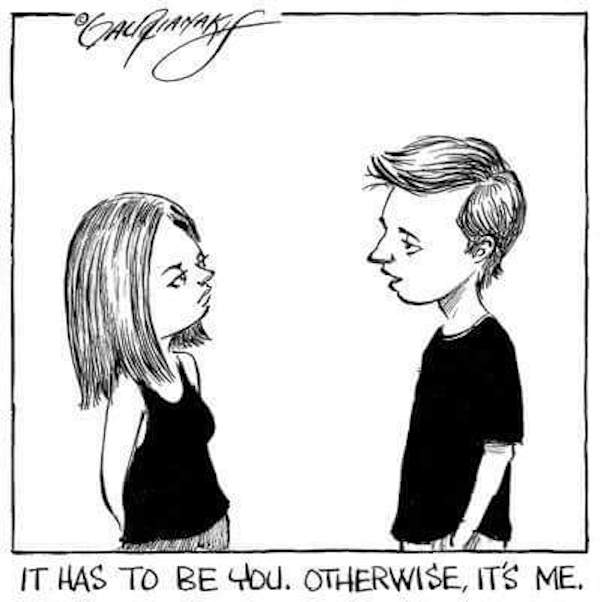How to Get the Most Out of Couples Therapy*
Improving your reactions to your partner is paramount. It takes effort from both partners on most issues to create a significant shift. For example: if I need to learn to be a better listener then it’s probable that my partner needs to learn to be a better speaker.
Good goals of couple’s therapy:
- Create a vision for how you aspire to be in the relationship, instead of wishing your partner would change,
- Increase your self-knowledge, knowledge about your partner and your interactions,
- Learn what core issues/wounds make your partner go off the rails and learn to intervene immediately with something soothing,
- Understand your blocks to personal growth and persist in looking for more,
- Collaborate on solving things as a team,
- Learn new patterns of interaction, practice them frequently and seek mastery of them,
- Review all the above regularly.
My main role is to help you improve the way you respond to your partner.
Your main role is to learn to respond differently to your partner while not jeopardizing your core values.
With online therapy (or tele-health) it is a bit more difficult for me to see your reactions to one another, so you may need to try even harder to work on not being reactive, and I may request that you be on the same camera and be looking at one another, and/or need to adjust the camera angle.
You can’t change your partner, though many of us spin our wheels trying. The only thing you can control in a relationship is yourself, so the most effective way to improve your relationship is to change yourself. Usually, this means reducing your emotional reactivity to your partner and seeking emotional calmness during an upset. Most couples blame their partner for the relationship struggles, which is unproductive. The best place to look for improvement is inside yourself.
 Many couples use a business model in their relationship. A business model of relationships and communication works fine for getting along and accomplishing tasks in the workplace, or scheduling things with children, etc., but it is largely ineffective in intimate relationships. The one exception, and it is a large exception, is that you need to remain calm under pressure in both business and intimate relationships. Other than remaining calm, a different set of communication styles and behaviors is needed in an intimate relationship.
Many couples use a business model in their relationship. A business model of relationships and communication works fine for getting along and accomplishing tasks in the workplace, or scheduling things with children, etc., but it is largely ineffective in intimate relationships. The one exception, and it is a large exception, is that you need to remain calm under pressure in both business and intimate relationships. Other than remaining calm, a different set of communication styles and behaviors is needed in an intimate relationship.
Ways of being with your partner that are helpful:
- Identify the unmet wants and needs of your partner and yourself and help one another meet them, creating more love to share and more satisfaction,
- Speak from your heart,
- Listen in a way that helps your partner be heard,
- Share your internal experience in a way that can be heard,
- Be curious, instead of furious.
Some common areas to focus on in couple’s therapy are:
- Communication (sending/speaking and receiving/listening),
- Conflict management and reduction of emotional intensity,
- Becoming more transparent and helping your partner be more transparent by increasing your curiosity–ask questions, instead of making statements about your partner,
- Create a future and vision for how you want the relationship to be,
- Create a future and vision for how you want your individual life to be (many people need more non-couple time as they are too wrapped up in the relationship being a huge life focus),
- Identify how you are when you are at your best and work toward being there more often,
- Build goodwill toward one another through acts of kindness.

Reducing conflicts and working out differences in the relationship is very important; however, it’s also necessary to improve on the good things in the relationship. Too much focus on negativity in therapy and in the relationship makes it so you don’t want to do the necessary work, let alone come back to my office. Working on some positives in the relationship builds connection and instills hope.
Important requirements for couples therapy:
- Have an agenda for each therapy session. Starting a therapy session with the fight of the week usually ends up being reactive and unproductive, creating more conflict. Instead, begin the session with a plan to steer it toward your more global relationship goals. Drive the session toward how you aspire to be when you are at your best. Agree, as a team, that you both understand an ineffective pattern and ask me for help in changing it. Please note that being agenda-driven is the opposite approach taken in most individual psychotherapies.
- Time commitment. You need time together to plan, engage and experiment with different approaches. You need time to work on conflict reduction and intimacy building.
- Letting go of emotional comfort. Therapy is about experimenting and taking risks and it can be scary. For example, if you usually go with the flow and acquiesce, then it will be a stretch for you to begin speaking up for your wants and needs. If you tend to be overbearing, then you will need to quiet down, listen and be curious instead of pushing.
- Remaining conscious. Most of us become unconscious and repeat old patterns from our families of origin or get emotionally reactive, particularly when under stress. Resist the temptation. When in conflict or when building a new pattern, slow down and remain aware of what is bubbling up inside of you.
- Self-confrontation versus other-confrontation. We spend too much time and energy focusing on what the other person is doing or not doing. We confront them and challenge them and pressure them and whine at them and get passive-aggressive with them. These things create more conflict. Confront yourself instead. Look inside yourself for what you can do to be an excellent person and change how you are and how you behave.
Inherent conflicts that emerge in therapy:

- Time together vs. time apart: A relationship takes time and nurturing. This can conflict with alone-time, family-time and work-time. You need time together to work through issues, to build connection and try out new ways of being together.
- Focus vs. unconscious: It takes a great deal of focus to continue improving and using new skills and styles together. It’s easy to be lazy and become unconscious and not practice new skills or abilities.
- Comfort vs. risk: Doings things differently will most likely feel risky. Acknowledge the fear and reach for the possibility of growth.
Can my relationship be saved?
At its greatest success, therapy helps all your dreams come true… Therapy is never at its greatest success. ☺
Seriously… a good definition of therapy is difficult. My real-life experience is that if someone helps me, then it’s therapeutic. If I don’t have a sense of gain from a therapeutic event, then I have the wrong person. If I see a massage-therapist and my body is not soothed by the session, I won’t go back. Psychotherapy is no different.
To “save” a relationship, both people must be committed to a win-win and be willing and able to look inside themselves for the causes and the struggles in a relationship. You can’t take the other person’s personality-inventory, analyze them and then change them. You can only change yourself. If you want to increase your chance of success in relationships, then work on these sentence completions with as much depth and breadth as you can muster.
- If my relationship were to improve, my contribution would be…
- Quirks about me that would make that difficult are…

Dig down deep on those two sentences.
Finally, don’t treat your relationship like a triple-heart bypass, where you forgot to notice your bad cholesterol for years. By that, I mean, don’t wait until the relationship is about to die and then ask a therapist if the relationship can be saved. Instead, work on those sentence completions regularly from the very first day of a relationship. Don’t have a heart attack and keep eating poorly and avoiding exercise. Improve your relationship at the first sign of struggle.
*Adapted from How to Get the Most from your Couples Therapy by
Ellyn Bader, Ph.D. and Peter Pearson, Ph.D., March 30, 2004, 23:24, from www.CouplesInstitute.com
Click to print a PDF copy of the How to get the Most Out of Couples Therapy page.
